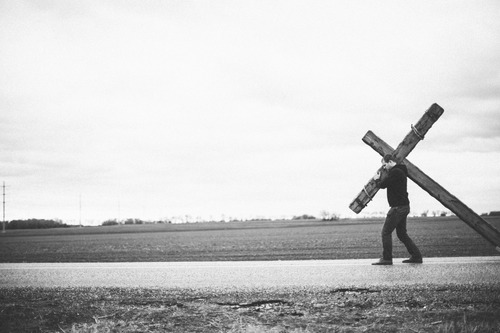This scripture is the heart of the gospel. It is the paradoxical good news of Jesus Christ. And yet it’s perhaps the hardest word to understand. Last week’s reading (Mark 8:14-26) was dominated with verbs about seeing. This week’s text is serious punctuated with verbs about speaking. It forms the core of the gospel of Mark, asking the question “Who do you say that Jesus is?” The story then ends pivoting on the follow-up question, “But what sort of Messiah is Jesus?”
Gathered in Caesarea Philippi, a gentile city proclaiming the divine greatness of the Roman Emperor, Jesus confronts and challenges his followers with the question of his identity. Why do others follow him? And why do these twelve follow Jesus? The narrative focus lasers in on Peter who gives the “correct” answer. But then quickly he’s forgetting the respect due his master, chiding and rebuking Jesus for his “incorrect” answer to the question of what sort of Messiah he is. The response of Jesus, looking at all of the disciples, points to the probability that it’s wasn’t only Peter who shared this satanic point of view.
The Old Testament/Jewish idea of the Messiah was anchored in the notion of triumph, military victory of the foes of Israel and God. It’s was far from anything like a Messiah who would suffer and die. Peter, and the others, are reacting from their context. They are on the way with Jesus, but they anticipate a militant atmosphere, believing the Way to be a divine victory march (cf. Isaiah 35:8 and also Isaiah 40:1-11; 42:1-9 & 52:1-12). Jesus has taken his time revealing his great secret. He is the Messiah: God’s holy warrior – taking on the enemies of Yahweh and the ultimate teacher – leading his disciples step by step in his Way towards abundant life.
Peter’s reaction seems anything but crazy. The master’s fate has direct consequences for his followers in their life. Jesus confounds and subverts their desire to share in the earthly messianic glory they expect for Jesus. Instead, they will soon to be bidden to take up their cross, and follow in the footsteps, the Way, of Jesus – towards his crucifixion (compare Mark 8:34-55 with Mark 10:35-45).
Jesus calls his disciples to take up their cross, to shoulder and bear their cross, and come after him. The expression (take up your cross) was a common one in that time, the image of giving oneself up for death. The Way of Jesus is one of sacrifice, suffering and ultimately death. All disciples must make a choice, and then live with a continuing determination, an existential choice to stick to a chosen path. You have to choose between following and not following. There is not other way. Only divine grace permits escaping the satanic condition of blindness and bondage, which here keep Peter from choosing the path of discipleship.
And us today? What kind of Messiah do we want? One that confirms our choices, patting us on the back? One that challenges and subverts our human desires for security, safety or stuff? How do we follow the Way when we come from a society that avoids and denies defeat, focusing only on victory?
Questions for Going Deeper:
- What word, phrase or image shimmers for you in the text?
- How does this intersect or interact with your life today?
- What invitation do you hear from God in this text to act, say, be or do?
